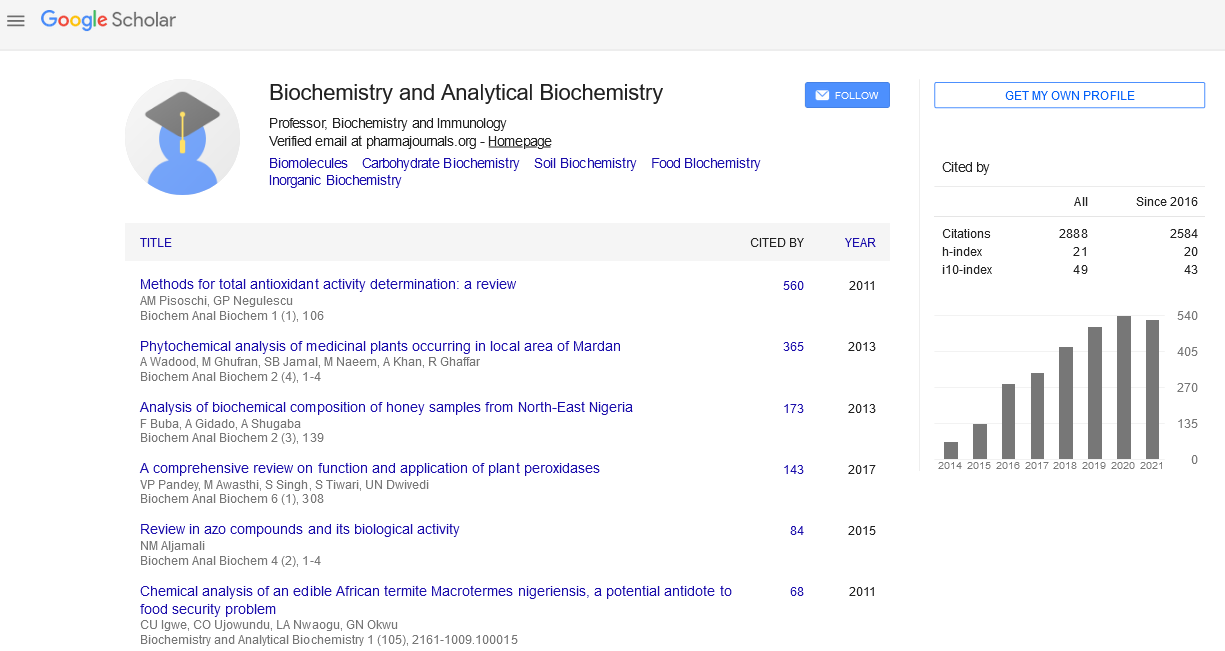Indexed In
- Open J Gate
- Genamics JournalSeek
- ResearchBible
- RefSeek
- Directory of Research Journal Indexing (DRJI)
- Hamdard University
- EBSCO A-Z
- OCLC- WorldCat
- Scholarsteer
- Publons
- MIAR
- Euro Pub
- Google Scholar
Useful Links
Share This Page
Journal Flyer

Open Access Journals
- Agri and Aquaculture
- Biochemistry
- Bioinformatics & Systems Biology
- Business & Management
- Chemistry
- Clinical Sciences
- Engineering
- Food & Nutrition
- General Science
- Genetics & Molecular Biology
- Immunology & Microbiology
- Medical Sciences
- Neuroscience & Psychology
- Nursing & Health Care
- Pharmaceutical Sciences
Endothelial glycocalyx of microcirculation is the custodian of vascular integrality in acute injuries
International Conference and Exhibition on Biochemical & Molecular Engineering
October 07-08, 2013 Hilton San Antonio Airport, TX, USA
Alexander V. Maksimenko
Accepted Abstracts: Biochem Anal Biochem
Abstract:
We have shown that covalent modification of one of glycosidases - bovine testicular hyaluronidase with chondroitin sulfate changed in the opposite way glycation nature of native and modified enzyme. Mono-and di-saccharides stronger inactivated native hyaluronidase than the modified chondroitin sulfate. Interaction with N-acetylhexosamines gave the opposite picture: a modified hyaluronidase inactivated more native. Such properties transformed native and modified hyaluronidases into an informative research test in vivo for determination of the dominant species of glycation agents in the bloodstream and their origin: increased content of sugars in the blood in disorder of carbohydrate metabolism or growth products of glycocalyx degradation in disturbances of the microcirculation (ischemia/reperfusion, embolization, inflammation, etc.). In the model of post ischemic perfusion of rat limbs we assessed recovery of microcirculation perfusion of hind limb to its initial level by using the laser Doppler flowmetry with the enzyme derivatives and their components. Native hyaluronidase accelerated recovery of the initial level of microcirculation, and the modified enzyme is expressed inhibited glycocalyx degradation products. Resulting from the administration of assayed derivatives with various schemes, the investigated data indicate the dominant presence of glycocalyx degradation products in the microcirculation after ischemic exposure. These findings point to the participation of endothelial glycocalyx in microcirculation disturbances, the direction of further work on the enzymatic regulation of glycocalyx state and development of new therapeutic approaches for the treatment of microvascular complications in acute cardiovascular injuries.
Biography :
Alexander V. Maksimenko, enzyme engineer of medical preparations, began his work in chemistry at Moscow State University, Chemistry Department where he received a Master of Science degree in 1975 and then Ph.D. in chemistry in 1978. He completed a Doctor of Science in biochemistry and cardiology in 1989 at USSR Cardiology Research Center. He has a long history of work at the Cardiology Center, Moscow beginning in 1978 to present. He is currently the Director of biochemical engineering laboratory, Professor in the Institute of Experimental Cardiology at Russian Cardiology Research-and-Production Complex, Moscow, Russia. He has published more than 200 papers and is the holder of over ten Russian and foreign patents. His research interests are focused on therapeutic enzymes, polymeric drugs, dosage regimen, courses of enzyme therapy, drug targeting and therapeutic compositions.


